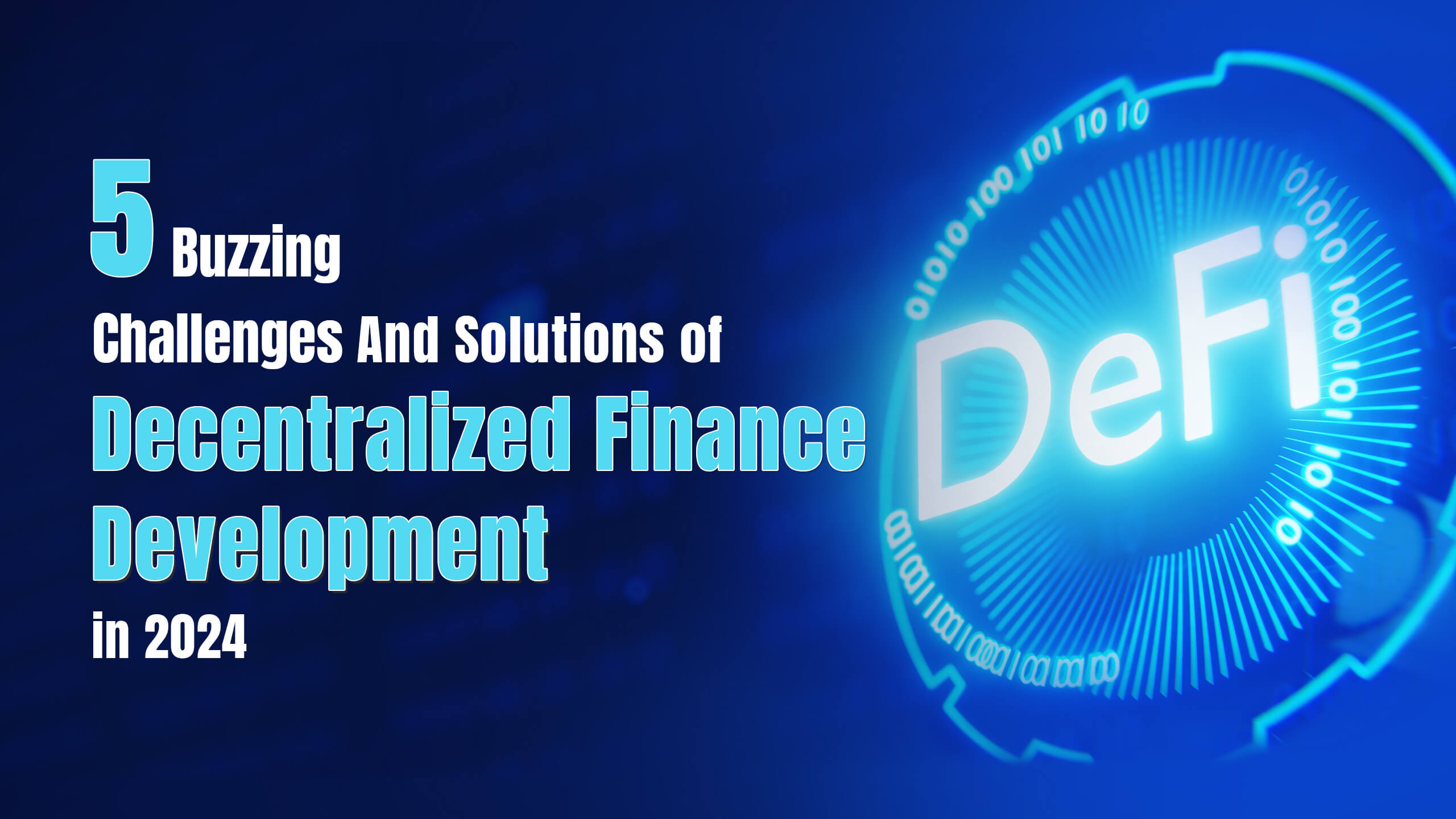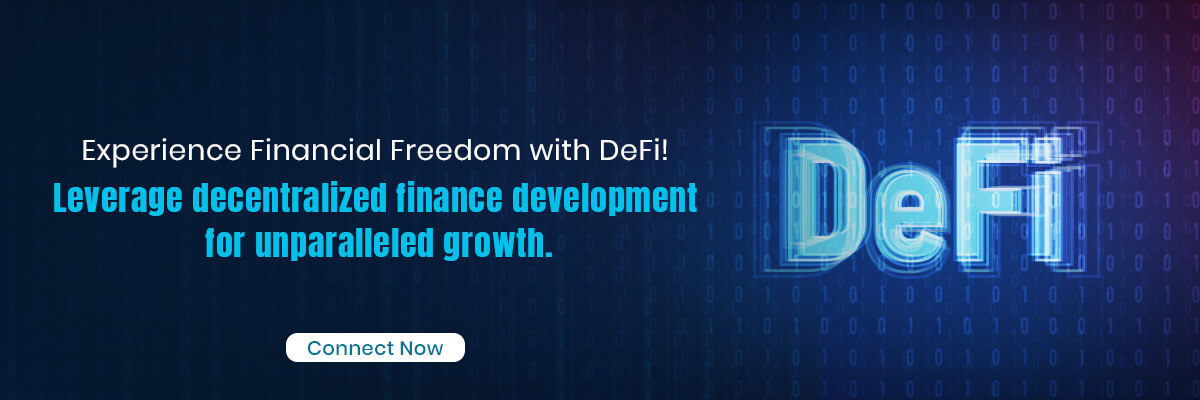Want to grasp and gain insights about the hot challenges that will hinder the secure decentralized finance industry in 2024? What could be the most relevant challenges that developers need to dodge while DeFi is consistently revolutionizing the financial sphere? Let’s dig into these five buzzing challenges and decipher creative solutions to combat them in decentralized finance development.
Commonly referred to as DeFi, decentralized finance development is a new way of doing things in the financial industry that uses blockchain technology to create an open, transparent, and accessible financial system. However, notwithstanding its transformative potential, DeFi has its own unique set of challenges. This article will elaborate on five key issues in decentralized finance development and how they can be addressed.
Challenge 1: Scalability Issues
-
Scalability Issues in Decentralized Finance Development
Scalability continues to be one of the biggest hurdles that Decentralized Finance Development must overcome. As the number of users and transactions on DeFi platforms increases, the underlying blockchain networks like Ethereum frequently struggle to keep up with this rising amount of activity. Consequently, it slows down transaction rates and raises costs, leading to decreased user volumes, thereby constraining the growth rate for DeFi applications.
-
Solution
Developers have proposed various solutions aimed at overcoming scalability problems. By conducting transactions from the main chain and then recording their results off-chain, Layer 2 scaling solutions such as rollups and sidechains could help increase transactions significantly. Besides that, some of these issues may be alleviated by moving towards more scalable blockchain protocols like Ethereum 2.0, which employs a Proof of Stake (PoS) consensus mechanism. Faster and cheaper transactions are beneficial when they come about as infrastructure scales, making it possible for more people to use them, thus improving their user experience.
Challenge 2: Security Concerns
-
Addressing Security Concerns in Decentralized Finance Development
Security is a major concern when it comes to decentralized finance development projects. DeFi platforms often become targets for hackers due to the large amounts of assets they manage. Advanced contract vulnerabilities, phishing attacks, or exploits can result in significant financial losses for users while damaging the credibility of DeFi-related projects.
-
Solution
Having robust security measures can help businesses address these risks better than ever before. Regular smart contract audits by reputable security firms can identify and rectify vulnerabilities before they are exploited. Moreover, best practices in innovative contract development, such as using established libraries and frameworks, have proven effective at reducing errors. Additionally, multiple authorizations for essential activities through multi-signature wallets and decentralized governance models would increase the level of security by making it more difficult for unauthorized individuals to make any changes or gain access.
Challenge 3: Regulatory Uncertainty
-
Navigating Regulatory Uncertainty in Decentralized Finance Development
Regulatory uncertainty is a significant challenge faced by developers in DeFi due to the ever-changing nature of the regulatory landscape. Different jurisdictions have different regulations governing financial services, which creates complications for DeFi platforms that must adhere to these complex requirements. This hinders entry into new markets and limits the global reach of DeFi projects.
-
Solution
For DeFi projects to keep up with regulatory changes and advocate for favorable rules, it implies that interacting with regulators or joining industry associations is the key. Establishing compliance teams and legal frameworks within DeFi projects can ensure they adhere to the existing rules while being flexible enough to adapt with time. Building trust through transparency and proactively engaging regulators can also help create an environment where regulations are more supportive.
Challenge 4: User Experience
-
Enhancing User Experience in Decentralized Finance Development
User experience (UX) is a critical determinant of success in designing decentralized finance development platforms. Many users would find several DeFi applications’ interfaces quite complicated, especially first-time users who may take longer to get used to them, therefore discouraging their use among other potential adopters because of fear of struggling with the complexity of these platforms.
-
Solution
DeFi developers should concentrate on building intuitive and user-friendly interfaces to improve the user experience (UX). In addition, DeFi platforms need to be made easily accessible to non-technically inclined people by simplifying the procedure of admitting others into the system, providing clear directions, and offering customer support. Besides, this can be facilitated by introducing some of the conventional financial models, such as fiat off-ramps and on-ramps, that can enable the quick transition from traditional finance systems to DeFi.
Challenge 5: Interoperability
-
Realization of Interoperability within the Development of DeFi
DeFi ecosystems need to be interoperable if they are to function seamlessly. Currently, many DeFi platforms operate in isolation and can only interact with other blockchains and applications to a lesser extent. This incompatibility may result in silos that restrict the efficiency and use of DeFi services.
-
Solution
By creating cross-chain protocols and standards, it is possible to enhance interactions between different DeFi platforms and blockchains. Such projects as Cosmos and Polkadot are aimed at establishing a more integrated blockchain ecosystem. Through leveraging these technologies, DeFi developers can allow for transferable assets that could be used across various platforms, thus enhancing the overall functionality and user experience of DeFi applications.
Wrapping Up
To sum up, even though decentralized finance development faces multiple challenges, it is worth noting that creative solutions and continued progress are opening the way for a stronger and more accessible DeFi environment. Addressing scalability issues, improving security measures, navigating regulatory ambiguity, enhancing UX/UI designs, and attaining holistic operation will aid DeFi developers in unleashing decentralized finance’s potential.
The importance of collaboration and knowledge sharing within the DeFi community cannot be overstated as we explore these solutions further. We at Web 3.0 India are committed to fostering innovation and excellence in decentralized finance development. Our team of professionals focuses on developing secure, scalable, and user-friendly DeFi solutions that can redefine the financial space.
Venture onto this promising path towards transforming finance—connect with Web 3.0 India now for more information about our services related to decentralized finance development challenges. Let us join hands together in shaping a decentralized future!





